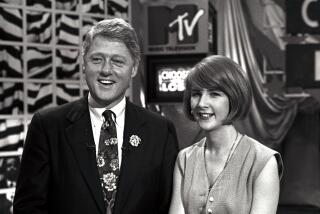Times of London Joins the ‘Ms.’ Decade
LONDON — The venerable Times of London bowed to the demands of a vulgar modern age today, revising its Victorian-era style guide to include such brash and contemporary language as the title “Ms.”
The 205-year-old newspaper--whose readers tend to regard its eccentricities as a national treasure on the order of Big Ben--introduced the usage changes in today’s editions.
Editor Simon Jenkins tried to break the news gently.
“The mirror that a newspaper holds up to the world is constantly smudged with jargon, bad usage and verbosity,” wrote Jenkins, who took over in March. “A style guide is a periodic cleansing of that mirror.”
The Times style guide, introduced at the turn of the century, was last revamped in the mid-1960s.
There were regular updates, but the guide remained “terribly restrictive and quite Victorian,” said literary editor Philip Howard, who helped write the new guide.
The old style guide was replete with arcane treasures such as The Times’ singular spelling of Mikhail S. “Gorbachov.” Its rendering of the Soviet leader’s name was based on its transliteration of the Cyrillic letters.
“Our Russian specialists know that our spelling is better, but if the rest of the world spells it another way, ours looks very odd,” Howard said. “We’re right, but we’re wrong.”
So from now on, it’s Gorbachev.
Under the old style, The Times referred to Leonardo da Vinci’s masterpiece as the “Monna Lisa,” a spelling that might seem to some as mysterious as the lady’s smile. It will revert to “Mona Lisa.”
“The old Times style book said that one should always spell ‘Monna Lisa’ with two n’s to show that we are gents and that we know that it comes from Monna, which is derived from the Italian Madonna,” said Howard.
But that and other displays of erudition, he conceded, also “came to look very odd.”
From now on, “Ms.” will be automatically used in Times news columns for American women. For the rest of womanhood, it will be trotted out on special request.
The Times is bracing for some flak over that one.
“When ‘Ms.’ is used in the Times we get angry letters, often written by women, who want to know what is that vulgar new word and how do you pronounce it,” said Howard, author of “We Thundered Out: 200 Years of the Times 1785-1985.”
Howard thinks use of Ms. will make journalists’ jobs easier, however.
“It is awkward for a reporter to have to go up to a woman after a lecture and ask her if she is married,” Howard said. “A younger woman is likely to tell them to mind their own business.”
More to Read
Sign up for our Book Club newsletter
Get the latest news, events and more from the Los Angeles Times Book Club, and help us get L.A. reading and talking.
You may occasionally receive promotional content from the Los Angeles Times.





